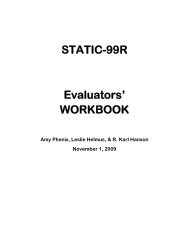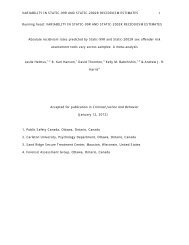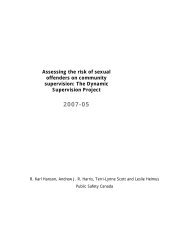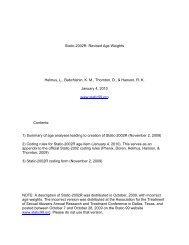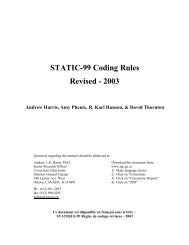Static-2002 coding rules (2009) - Static-99
Static-2002 coding rules (2009) - Static-99
Static-2002 coding rules (2009) - Static-99
Create successful ePaper yourself
Turn your PDF publications into a flip-book with our unique Google optimized e-Paper software.
Category 5: General Criminality<br />
It does not count as a sentencing occasion if the additional time was designated<br />
to be served concurrently or if it only changed the parole eligibility date. This<br />
situation is presently not possible in Canada. The only exception to this rule is for<br />
“Lifers,” Dangerous Offenders, and others with indeterminate sentences. For<br />
offenders with indeterminate sentences, if their parole was revoked and they<br />
were returned to prison for a new offence, this counts as a sentencing occasion.<br />
The rationale for this difference is that in general, the standard of proof<br />
necessary to return an offender to prison without adding additional time to their<br />
sentence is insufficient to meet the standards that typically define a sentencing<br />
occasion (e.g., a conviction). However, for offenders with an indeterminate<br />
sentence, even when there is enough evidence to obtain a conviction, it is rare to<br />
charge the offender with the new offence.<br />
Failure to Appear<br />
If an offender fails to appear for sentencing, this is not counted as a sentencing<br />
occasion. Only the final sentencing for the charge for which the offender missed<br />
the sentencing occasion is counted as a sentencing occasion.<br />
Failure to Register as a Sexual Offender<br />
If an offender receives a formal legal sanction, having been convicted of failing to<br />
register as a sexual offender, this conviction counts as a sentencing occasion. It<br />
should be noted, however, that charges and convictions for failure to register as<br />
a sexual offender are not counted as sentencing occasions for sexual offences.<br />
Graduated Penalty Offences<br />
In some jurisdictions, an offence committed once is not punishable by jail or a<br />
community sentence, but can only be punished by a fine. Further offending of the<br />
same type, however, can lead to a jail sentence. For example, a first offence of<br />
driving while intoxicated (or under the influence) may maximally lead to a fine,<br />
but subsequent adjudications of guilty for driving while intoxicated (or under the<br />
influence) can each result in a jail sentence. If a behaviour can eventually lead to<br />
jail and/or community supervision, it counts as prior involvement with the criminal<br />
justice system or a prior sentencing occasion, even on the first offence.<br />
Juvenile Extension of Detention<br />
In some states it is possible for a juvenile to be sentenced to a Detention/<br />
Treatment facility. At the end of that term of incarceration it is possible to extend<br />
the period of detention. Even though a judge and a prosecutor are present at the<br />
proceedings, because there has been no new crime or charges/convictions, the<br />
extension of the original order is not considered a sentencing occasion.<br />
82



